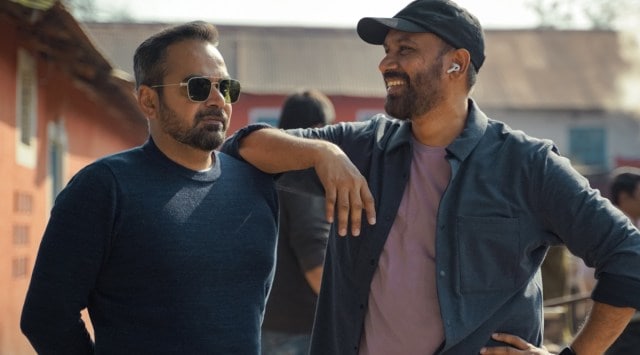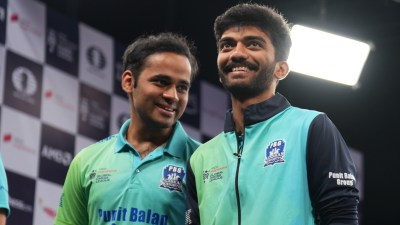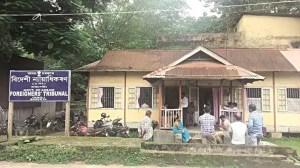Their latest seven-episodic Netflix crime comedy series premiered last week. Set in the ‘90s, Guns & Gulaabs follows a lovestruck mechanic Paana Tipu (played by Rajkummar Rao), a reluctant heir to a ruling gang, an honest officer-turned-agent-of-chaos (Dulquer Salmaan) and a menacing killer chaar-cut Atmaram (Gulshan Devaiah). The show, co-written by Suman Kumar with dialogues by Sumit Arora, is about what happens when their worlds collide.

In an interview with Indianexpress.com, Raj and DK, whose works across films and streaming space have established themselves as the two of the biggest directors of the country, deep dive into the making of Guns & Gulaabs, how the show is a “letting go” series for them, the need to constantly shift genre and why third season of The Family Man or the next instalment of Guns & Gulaabs isn’t as exciting as creating a new world from the scratch.
Edited excerpt:
Both of you came to Mumbai with truckloads of stories, which slowly started to get made. When was Guns & Gulaabs born?
Raj: All of these have roots which are way back in time for us. This was an idea we had long back called, ‘The Last Benchers’. The people in the back who you don’t notice. They are just there, doing their job. In a classroom, the teacher doesn’t see the last benchers clearly, but there is something interesting going on there. The idea was about these inconsequential people who have limited dreams compare to other people. Like when Tipu says, ‘One day I will become a successful mechanic!’ They are quite limited in their ambition and aspirations.
We wanted to do it in a very cinema-scopic way. Where it is larger than life, there is music, people are dressed up differently, there is dialoguebaazi. This is a familiar terrain for us, in our heads, it may not look it, our filmography may not see that we could do it. But Stree was as local as we could go and now even with Guns and Gulaabs.
Even Shor in The City, it was set in Mumbai but had characters which–
DK: Yes, it was set in Mumbai, but it was still grounded. But now we have gone to the interiors. The additional thing here is the 90s, the era when we were growing up. So there is this nostalgic element that kicks in. That’s where the show is very special, because it is literally our childhood moments transported here.
Story continues below this ad
Guns and Gulaabs seems like your Gangs of Wasseypur and one obviously different from the world of The Family Man and Farzi.
Raj: In all our films, we were consciously going away from it. We did Shor in the City and everyone thought we are ‘serious’ filmmakers. Then you do a stoner comedy like Go Goa Gone and people are like, ‘Where did this come from now?!’ Stree was such a local thing while The Family Man took on geopolitics. Every time there is a successful series, like The Family Man, everyone calls and tells us, ‘We want another Family Man!’ That’s where it starts but our answer is always no, because we don’t want to do another one. Like, Stree, the (conversation is), ‘Hey let’s do a five-film deal with all horror comedies.’ No we don’t want to do it anymore, maybe we will come back to it later to revisit the genre.
What keeps us going is creating a new world each time. With Guns & Gulaabs, we not just went with a new idea but even the look of it. If you look at Family Man, Farzi, Guns & Gulaabs, they have absolutely distinct cinematography, style, visuals, dialogues. There is a core that you will see which is ours. We don’t want to repeat ourselves; we want to try all kinds of things. Guns and Gulaabs was our letting go series, where we were like, ‘Let’s just be free, let’s have fun, let’s make it crazy!’
We put in all the elements in it that we loved, the elements what made us filmmakers initially. We thought let’s go back to 99, Shor in the City. I also felt that in the landscape of series, there are dramas, crime, biographies, it is all pretty serious. It is good, intense viewing, so we thought why not just break it and put a show that is just pulp.
Story continues below this ad
DK: A lot of thought has gone into it. A lot of seriousness has gone into the making of it. Every little scene has been thought through, very seriously, carefully put together.
Raj: Gangs of Wasseypur, Mirzapur are great projects by themselves. I wouldn’t want to make another one because it is already there. This is not even a gangs series for me, it is just a backdrop. Is it a story about opium? No, it’s just incidental. It’s really about innocence, love, the things we do for love and nostalgia. Even in nostalgia, we are not showing close ups of Bournavita or something like that to drill the point.
Is there a conscious attempt to ensure that some of your trademark quirks don’t end up becoming a template?
DK: That’s a constant thought. If we feel we are repeating ourselves, that’s the first thing we don’t do. As much as we think that, ‘Ok there’s a certain show or film in this genre’, we cannot be seen as similar. We have to make ours different and also different from what we have done before. If there is a certain format of a joke or a scene, if it feels like we have done it before, we consciously avoid it.
Raj: Or we consciously embrace it and do a recall. That’s just a fun, Easter Egg of sorts.
Story continues below this ad
DK: Like throwing in the word ‘Family Man’ here or putting the effigy of a woman in a red saree as hat tip to Stree, those are just little nods to our own work. There is a certain inner core that must be coming through, which is part of our personality.
Raj: The good thing is we are writing, directing and producing it, so there is a lot of creative control. From the start to edit to release, everything is in control. When you are in control of most of the spectrum, you are able to give viewers what you really want to convey. The thought of not repeating ourselves is there which is why we run away from a genre. Once we finish a Family Man, it is such a successful franchise so why (go into it immediately) but for me, making a season two of Guns and Gulaabs or Family Man season three is not the biggest excitement. It is the audience that wants it so I would love to make it for them, because that’s what we do. What I would want to do is move on to the next world we can create.




































